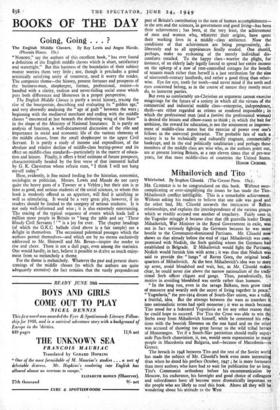BOOKS OF THE DAY
Going, Going . . . ?
The English Middle Classes. By Roy Lewis and Angus Maude. (Phoenix House. 15s.)
NOBODY," say the authors of this excellent book, "has ever found a definition of the English middle classes which is short, satisfactory and watertight." But this haziness of the boundaries of their subject matter worries them very little ; nor, though it precludes a grand artistically satisfying unity of treatment, need it worry the reader. The composite theme—the history, present fortunes and prospects of the business-man, shopkeeper, farmer, professional, rentier—is handled with a clarity, realism and never-failing social sense which puts both differences and likenesses in a proper perspective.
The English Middle Classes is partly a social history, tracing the rise of the bourgeoisie, describing and evaluating its " golden age," and very shrewdly analysing the " age of guilt " between the wars ; beginning with the mediaeval merchant and ending with the middle classes " ensconced at last beneath the sheltering wing of the State " in the shape of the Ministry of National Insurance. It is partly an analysis of function, a well-documented discussion of the role and importance in social and economic life of the various elements of the middle classes, from the small shopkeeper to the upper Civil Servant. It is partly a study of income and expenditure, of the absolute and relative decline of middle-class buying-power and its effect on middle-class standards—particularly in the matter of educa- tion and leisure. Finally, it offers a brief estimate of future prospects, characteristically headed by the first verse of that immortal ballad by G. K. Chesterton whose refrain runs, " I think I will not hang myself today."
Here, evidently, is fine mixed feeding for the historian, economist, sociologist or politician. Messrs. Lewis and Maude do not carry quite the heavy guns of a Tawney or a Veblen ; but their aim is at least as good, and serious students of tlfe social sciences, to whom this book is modestly offered as an appetiser, will find it satisfying as well as stimulating. It would be a very great pity, however, if its readers should be limited to the category of serious students. It is not only well-informed and wise ; it is also extremely entertaining. The tracing of the typical sequence of events which leads half a million more people in Britain to " bang the table and say ' These bloody Civil Servants ! ' " is a joy for ever. The chapter headings (of which the G.K.C. ballade cited above is a fair sample) are a delight in themselves. The occasional polemical passages which the authors permit themselves—and which- are by no means exclusively addressed to Mr. Shinwell and Mr. Bevan—inspire the reader to rise and cheer. There is not a dull page, even among the statistics. One would hardly, in fact, believe it possible to derive so much enjoy- ment from so melancholy a theme. For the theme is melancholy. Whatever the past and present short- comings of the middle classes (to which the authors are quite adequately attentive) the fact remains that the vastly preponderant part of Britain's contributiN to the sum of human accomplishment— in the arts and the sciences in government and good living—has been their achievement ; has been, at the very least, the achievement of men and women who, whiateVer their origins, have spent their working lives in a middle - class - ambience. Now the conditions of that achievement 'are being progressively, de- liberately and to all appearances finally eroded. One should, perhaps, make no reckoning of the merely individual dis- comforts entailed. To the happy class - warrior the plight, for instance, of an elderly lady legally forced to spend her entire income on the upkeep of a row of rent-controlled cottages for the benefit of tenants much richer than herself is a just retribution for the sins of nineteenth-century landlords, and rather a good thing than other- wise. Eye for eye, tooth for tooth—and never mind if the teeth and , eyes concerned belong, as in the course of nature they mostly must do, to innocent parties.
But even so comfortably un-Christian an argument cannot exorcise . misgivings for the future of a society in which all the virtues of the commercial and industrial middle class—enterprise, independence, thrift—are either regarded as crimes or rendered. impossible ; in I which the professional man (and a fortiori the professional woman) is denied the leisure and elbow-room to think ; in which the bait for ambition, the reward for education, is not the attainment or improve- ;- ment of middle-class status but the exercise of • power over one's;:fr fellows in the universal proletariat. The probable fate of such a society is to be technically and culturally stagnant, commercially if bankrupt, and in the end politically totalitarian ; and perhaps those members of the middle class are wise who, as the authors point out, are at present leaving Britain, at a rate eleven times that of pre-war years, for that most middle-class .of countries the United States.
HONOR GROOM.


































 Previous page
Previous page